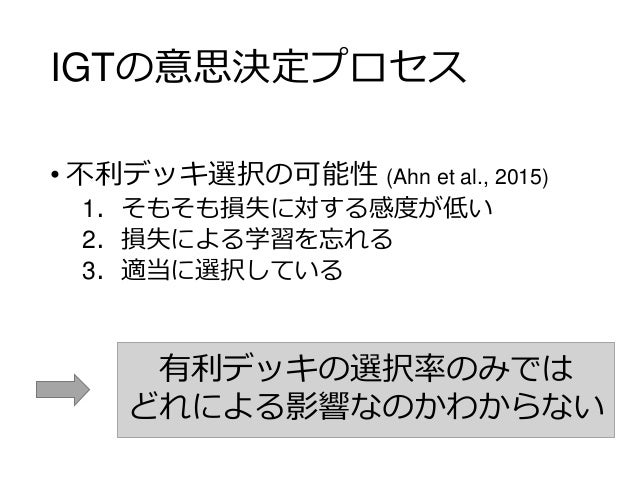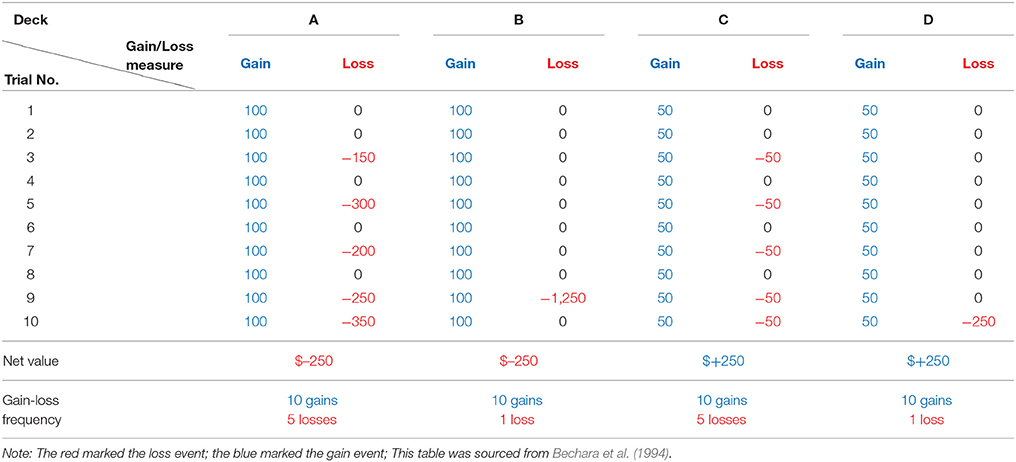Iowa Gambling Task Bechara 1994
Decisions aren't only made through 'rational' and conscious assessment of options; emotional processing matters. But what role does emotion play in decision making? Antonio Damasio's 'somatic marker' hypothesis holds that we use somatic markers (essentially, gut feelings) to guide decisions when cognitive faculties are busy or when we lack resources or information (Damasio, Tranel & Damasio, 1991). These 'gut feelings' may act subconsciously, steering us towards advantageous options even in the absence of a conscious understanding of the benefits or consequences of a choice.
Apr-Jun 1994;50(1-3):7-15. Doi: 10.1016/0010-028-3. Authors A Bechara 1, A. Using a novel task which simulates real-life decision-making in the way it. Roulette is one of Iowa Gambling Task Bechara 1994 the most popular casino games online that will entertain you for hours! Choose your lucky numbers and start spinning the wheel. Choose your lucky numbers and start spinning the wheel.
The Iowa gambling task is a psychological task thought to simulate real-life decision-making. It was introduced by Bechara, Damasio, Tranel and Anderson (1994), then researchers at the University of Iowa. It has been brought to popular attention by Antonio Damasio, proponent of the Somatic Marker Hypothesis and author of Descartes' Error. We have leveraged our industry experience to Iowa Gambling Task Bechara Et Al 1994 work out some cool and exclusive no deposit bonuses from some of the best casinos around for US players. The bonus codes on our site are unique, which means you can use them only if you get to the casino through our website. The empirical evidence that Damasio and colleagues have relied most heavily on to support the SMH refers to the results of what is now known as the Iowa Gambling Task (IGT). This task was first proposed by Bechara et al.
Iowa Gambling Task Bechara 1994 Movie
One way Damasio demonstrated the effects of somatic markers was through the Iowa gambling task (e.g., Bechara, Damasio, Damasio, & Anderson, 1994). In this task, participants are presented with four decks of cards and instructed to choose a card from any of the decks. Each time they chose a card, they either win or lose some money based on what card was drawn. The 'trick' to the task, unknown to the participants, is that two of the decks have small rewards and penalties, but over the long-term will lead to a gain of money. The other two decks have large rewards but also large penalties, and over the long-term will lead to a net loss of money.
Typically, participants end up exclusively selecting cards from the money-winning decks, usually within 40 or 50 trials. But Damasio argues that decisions are guided by somatic markers even before participants are consciously aware of which decks are 'good' or 'bad'. Evidence for his claim comes from skin conductance responses (a measure of emotional arousal), which are higher before 'bad' decisions than 'good' ones, even before the participant has consciously recognized which deck is most rewarding. This finding suggests that the emotional system--via somatic markers--guides participants towards the money-winning decks even before they've consciously recognized them (Bechara, Damasio, Tranel, & Damasio, 1997).
Performance in the Iowa gambling task is also sensitive to brain injury. For example, patients with damage to the orbitofrontal cortex continue to choose from money-losing decks and do not show those variable skin conductance responses. Patients with damage to the ventromedial prefrontal cortex also choose bad decks, but their choices are thought to happen because they are unable to recognize that the higher short-term rewards of the losing decks are countered by larger penalties (Bechara, Damasio, Tranel, & Damasio, 2000).
Iowa Gambling Task Bechara 1994 -
Other researchers have questioned the somatic marker hypothesis and the utility of the Iowa gambling task. Tiago and McClelland (2004) replicated the original gambling task research, but added their own self-report measure of participants' awareness of the long-term advantages and penalties of different decks. Using their method for self-report, participants showed awareness of the advantageous decks even before they began selecting them exclusively, and well before the 40-50 trials Damasio suggested were necessary.
| Standard (default) | Based on the standard Iowa gambling task described by Damasio et al. (1991). Fifty trials are completed using four decks. Two decks have small rewards and penalties, but lead to net gain over time. Two decks have large rewards and large penalties, and lead to net loss over time. |
|---|---|
| Five Decks | This version adds a fifth deck (and ten additional trials) to the standard version. The fifth deck, compared to the other four, has medium penalties and medium rewards, and over time these balance out such that selecting deck five neither gains or loses money in the long run. |

Bechara, A., Damasio, A.R., Damasio, H., & Anderson, S.W. (1994). Insensitivity to future consequences following damage to human prefrontal cortex. Cognition, 50, 7-15.
Bechara A., Damasio H., Tranel D., & Damasio A.R. (1997). Deciding advantageously before knowing the advantageous strategy. Science, 275, 1293-1295.
Bechara A., Damasio H., Tranel D., & Damasio A.R. (2000). Characterization of the decision-making deficit of patients with ventromedial prefrontal cortex lesions. Brain, 123, 2189-2202.

Damasio, A.R., Tranel, D. & Damasio, H. (1991). Somatic markers and the guidance of behaviour: theory and preliminary testing. In Levin, H.S., Eisenberg, H.M., & Benton, A.L. (Eds.), Frontal lobe function and dysfunction (pp. 217-229). New York: Oxford University Press.
Tiago, M. & McClelland, J. (2004). A reexamination of the evidence for the somatic marker hypothesis: What participants really know in the Iowa gambling task. Proceedings of the National Academy of Sciences, 101, 16075–16080.
| Trial Number | Trial number in the current block |
|---|---|
| Deck Selection | Deck number chosen by participant |
| RT | Time taken (in ms) to make deck selection |
| Reward | Reward/gain from deck selection |
| Penalty | Penalty/loss from deck selection |
| Current Total | Participant's net total after this trial |
The Iowa gambling task is a psychological task thought to simulate real-life decision-making.It was introduced by Bechara, Damasio, Tranel and Anderson (1994), then researchers at the University of Iowa. It has been brought to popular attention by Antonio Damasio, proponent of the Somatic Marker Hypothesis and author of Descartes' Error. The task is sometimes known as Bechara's Gambling Task, and is widely used in research of cognition and emotion.
Participants are presented with 4 virtual decks of cards on a computer screen. They are told that each time they choose a card they will win some game money. Every so often, however, when they choose a card they will win money, but will also lose some money too. The goal of the game is to win as much money as possible. Every card drawn will earn the participant a reward ($100 for Decks A and B; $50 for Decks C and D). Occasionally, a card will also have a penalty (A and B have an total penalty of $1250 for every ten cards; C and D have a total penalty of $250 for every ten cards). Thus, A and B are 'bad decks', and C and D are 'good decks', because Decks A or B will lead to losses over the long run, and Decks C or D will lead to gains. Deck A differs from B and Deck C differs from D in the number of trials over which the losses are distributed: A and C have five smaller loss cards for every ten cards; B and D have one larger loss card for every ten cards.
Most healthy participants sample cards from each deck, and after about 40 or 50 selections are fairly good at sticking to the good decks. Patients with orbitofrontal cortex (OFC) dysfunction, however, continue to perseverate with the bad decks, sometimes even though they know that they are losing money overall. Concurrent measurement of galvanic skin response shows that healthy participants show a 'stress' reaction to hovering over the bad decks after only 10 trials, long before conscious sensation that the decks are bad. By contrast, patients with OFC dysfunction never develop this physiological reaction to impending punishment. Bechara and his colleagues explain this in terms of the somatic marker hypothesis. The Iowa gambling task is currently being used by a number of research groups using fMRI to investigate which brain regions are activated by the task in healthy volunteers as well as clinical groups with conditions such as schizophrenia and obsessive compulsive disorder.
References[edit edit source]
Iowa Gambling Task Online
Bechara A, Damasio AR, Damasio H, Anderson SW (1994). Insensitivity to future consequences following damage to human prefrontal cortex. Cognition, 50: 7-15.
Assessment Biopsychology Comparative Cognitive Developmental Language Individual differences Personality Philosophy Social
Methods Statistics Clinical Educational Industrial Professional items World psychology
Cognitive Psychology:Attention · Decision making ·Learning · Judgement ·Memory · Motivation · Perception · Reasoning ·Thinking -Cognitive processesCognition -OutlineIndex

External links[edit edit source]
A free implementation of the Iowa Gambling task is available as part of the PEBL Project[1]
Iowa Gambling Task Bechara 1994 Full
| This page uses Creative Commons Licensed content from Wikipedia (view authors). |